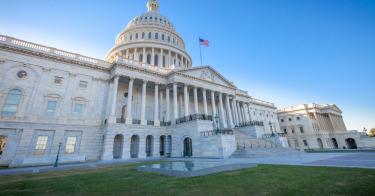The U.S. Senate should vote this week to reauthorize Section 702 of the Foreign Intelligence Surveillance Act (FISA) because it is a vital tool needed to fight global terrorism and combat foreign intelligence operations.
Some critics – concerned about the Christopher Steele dossier and FISA’s possible misuse by agents and lawyers at the FBI and the Department of Justice – want to let Section 702 expire. That would be an unwise and dangerous move.
Section 702 of FISA was originally created in 2008. The section, which expired at the end of December and was temporarily extended through Friday of this week, gives our intelligence agencies the ability to target non-U.S. persons “reasonably believed” to be outside of the U.S. and collect their online activities and electronic communications.
It is a violation of the law to collect information from targets inside the U.S. – whether they are Americans or foreigners – or to deliberately target the online communications of American citizens.
The House voted to reauthorize Section 702 on Thursday and the Senate is expected to vote on the reauthorization this week.
There is no question that Section 702 has been essential to our success in detecting, discovering, and disrupting terrorist plots against the U.S. and our allies, with whom we share some of that intelligence.
In fact, the Privacy and Civil Liberties Oversight Board, an Obama-era bipartisan panel of experts in the executive branch, reviewed Section 702 and reported that more than one-quarter of National Security Agency reports on international terrorism were based in whole or in part on information collected under the Section 702 program.
As former Attorney General Michael Mukasey said recently, allowing Section 702 to lapse would rebuild the surveillance “wall” that existed before the Sept. 11, 2001 terrorist attacks. It would likely also “take America back to the post-9/11 anguish of investigation into why available intelligence was not used, why dots were never connected,” he said.
Among other things, the FISA sets up the Foreign Intelligence Surveillance Court (FISC), which must approve all applications made by the executive branch – the FBI, Justice Department and other intelligence agencies – for classified warrants to engage in electronic surveillance, physical searches and other forms of investigative actions for foreign intelligence purposes.
The court sits in Washington, D.C., and is composed of 11 federal district court judges chosen by the chief justice of the Supreme Court. It is their job to make sure that the applications for warrants meet the legal standards under the FISA statute.
So how has the dossier complied by former British intelligence agent Christopher Steele affected the debate about the renewal of Section 702? Over the last few weeks, there have been credible allegations that Obama intelligence officials and the FBI used the unverified, unsubstantiated Steele dossier – compiled for Fusion GPS and paid for by Hillary Clinton’s presidential campaign – as the basis for applying for a FISA warrant to engage in unlawful surveillance of the Trump transition team.
Other Obama officials, including National Security Adviser Susan Rice, then requested the “unmasking” of names in intelligence reports to obtain information on the Trump team.
The contents of this dossier are unsubstantiated rumors at best. Steele himself has admitted they were “raw intelligence” provided by unnamed Russian sources and were “unverified.”
It is clear from reports that many of the claims in the dossier are obviously fraudulent. For example, the dossier claimed that Donald Trump’s lawyer, Michael Cohen, met with Kremlin officials in Prague in August 2016. Yet not only has Cohen never visited Prague, but he was in California with his son on the day the dossier claimed he was in Prague. This is just one of many inconsistencies and defamatory claims in this opposition research.
But this type of abuse, however serious, should not be allowed to damage our intelligence collection abilities. True or not, it is no reason to throw out what has been a valuable tool in our fight against terrorists who want to destroy us.
The situation is analogous to rare abuses that we see in the criminal justice system. For example, when law enforcement officials want to go after an individual who they believe has violated the law, they may have to apply to a court under the requirements of the Fourth Amendment to obtain a search warrant for whatever information, documents, or other physical evidence they believe is relevant to their case.
If a police officer lies to the court, and the court issues a search warrant based on false information, we don’t throw out the Fourth Amendment or the ability of law enforcement officials in other cases to obtain search warrants. What we do is sanction the officials involved in providing false information and throw out what was illegally obtained, as the warrant itself was defective.
Similarly, let’s suppose if it turns out to be true that FBI agents, Justice Department lawyers, and other intelligence officials applied for FISA surveillance warrants based on unverified, unsubstantiated, and/or false information that they had no reasonable basis to believe were valid.
In such a hypothetical case, federal officials should be sanctioned and possibly prosecuted for their unethical and potentially unlawful conduct. Any information or evidence derived through this surveillance could also be thrown out, and the courts would not allow its use in any proceedings.
Section 702 should be renewed because it is a vital national security tool. The Steele dossier is a separate and distinct matter. Anyone found to have corrupted the FISA process should be punished, and procedures have to be implemented at the Justice Department and the FBI to ensure that this type of abuse doesn’t happen again.
This piece originally appeared in Fox News



